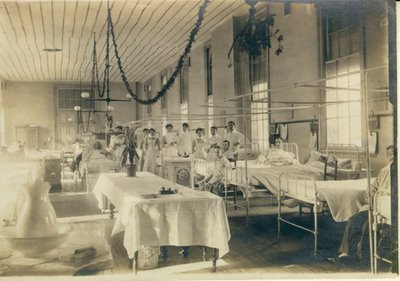Brokeback Medicine
 A study of Louisiana's healthcare system concluded that the state is woefully out of date and terribly inefficient.
A study of Louisiana's healthcare system concluded that the state is woefully out of date and terribly inefficient.
The way Louisiana provides health care is inefficient and outmoded, and the state should move away from its unique two-tiered system and reduce Louisiana State University's management role in the charity hospitals, a draft report commissioned by an arm of the Louisiana Recovery Authority says.I've always known that the way in the state provides healthcare is antiquated but I just didn't know in what way. Now that the system has been studied, we should have a guide in which to fix, or better yet, recreate it. But some people think that the only thing we need to do is rearrange the bedpans.
Louisiana's way of paying for health care has created an "overfed and obese" system of private and nonprofit hospitals for those who have insurance, while the 19 percent of residents without coverage are left in the financially strapped system of charity hospitals with long waits to receive basic care, according to the report by PricewaterhouseCoopers.
Donald Smithburg, who heads LSU's Health Care Services Division, strongly disagreed with the report's contention that Hurricane Katrina had "right-sized" the number of hospital beds in the New Orleans area. University officials are currently in negotiations with the U.S. Department of Veterans Affairs to build a new teaching hospital that would replace Charity and University hospitals.
"(For) the PricewaterhouseCoopers accounting firm to have thought, let alone write, the notion that we don't need more beds in the New Orleans region is unconscionable to me, and indicates that they really have not absorbed the impact of Katrina and her floods on that area," Smithburg said.
Well, according to the article, the charity system of hospitals were operating at only 54% capacity of their patients, but I'll bet they were staffed at 100%.
What the study was probably referring to is the charity system was right sized, not the entire healthcare system. However, there are shortages in the New Orleans area with certain aspects of healthcare, but not the system as a whole. For example, there are now emergency rooms in New Orleans with the exception of University Hospital which reopened part of its ER at a cost of $91 million. On the other hand, the maternaty ward at Ochsner is no where near capacity.
The real problem that hospitals are having is the influx of indigent and uninsured patients at priviate hospitals. This is creating a financial burden on many organizations.
But the problems are deeper and more broad that that.
Louisiana has the nation's only statewide system of public hospitals, and is also unique in how it pays for health-care services to the poor and uninsured. In other states the burden of caring for the uninsured is shared among the private and public hospitals, and federal dollars that reimburse hospitals for uncompensated care to the uninsured are spread out as well.
In Louisiana, the charity system gets virtually all of the federal "disproportionate share" dollars that compensate hospitals for the free care they provide for the uninsured. But the charities are limited in what they can collect from patients who are insured through Medicaid, and have a poor track record of attracting Medicare and private-pay patients whose care brings the highest reimbursement.
Thus, the poor have not place to go with Charity closed and the private hospitals are not being reimbursed adequately for providing care. As usual, the state government takes care of its own problems and leaves everyone else to fend for themselves.
Fortunately, the study provides some solutions:
-- Permanently assigning post-graduate medical residents to private and nonprofit hospitals, where many have trained since Katrina. Before the storms, the charity system was the training ground for the vast majority of post-graduate residents.
-- Spending $20 million over the next three to five years to create a "digital backbone" of electronic medical records so that people who are displaced in future catastrophes will have easier access to prescription drug information and other key information.
-- Taking "immediate action" to beef up the availability of long-term care beds in southeast Louisiana, so patients can be discharged sooner from hospitals.
-- Developing, financing and implementing a plan within 90 days to deal with an expected rise in mental-health disorders after Katrina. The report estimates that 260,000 adults and 120,000 children will need treatment, triple the pre-storm number, while the availability of care has shrunk dramatically.
Hopefully officials in Baton Rouge will listen and try to figure out what needs to be done to bring Louisiana's healthcare system into the 21st century. But don't hold your breath.

1 comment:
The article was very poorly written, but the 54% occupancy rate referred to all hospitals in the area (I think, like I said poorly written). Had I not experienced first hand the wait for a hospital bed at university hospital before I was insured, I'd of thought the same thing.
I thought that the report reflected the business concerns of the health care business rather than the health care concerns myself. Is anyone in La. even aware of the nationwide dichotomy?
Plus there's a difference in making changes that reflect the population shift to B.R., and changes that would make the shift permanent.
Post a Comment